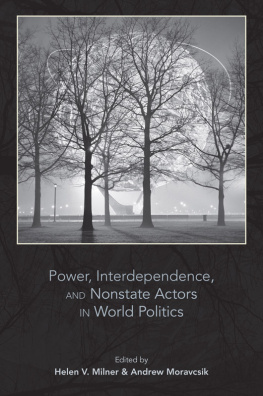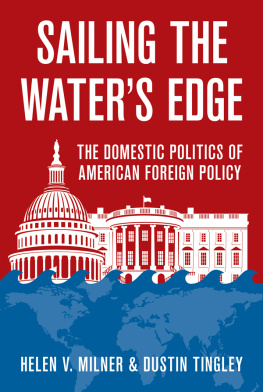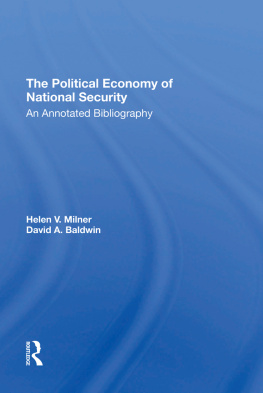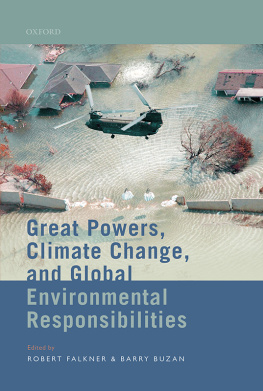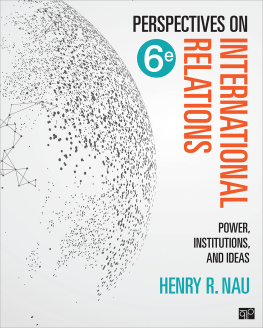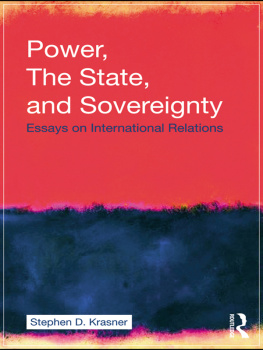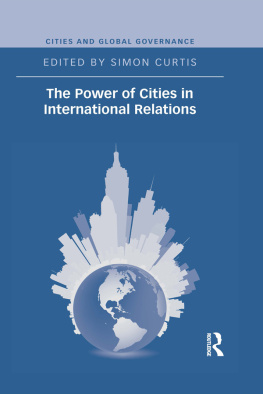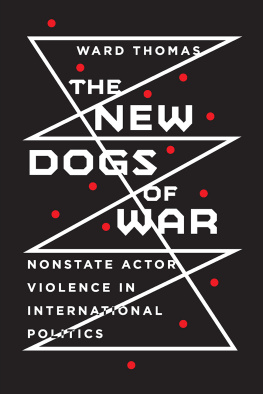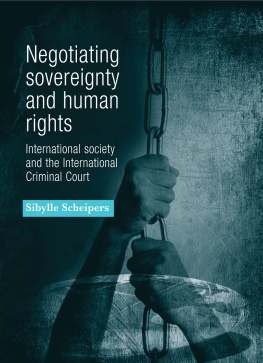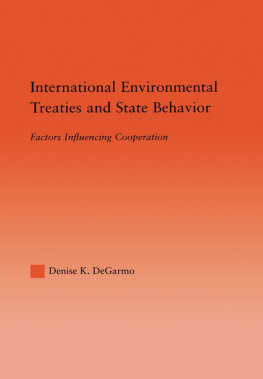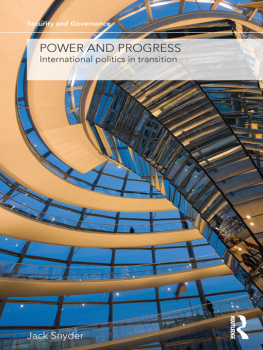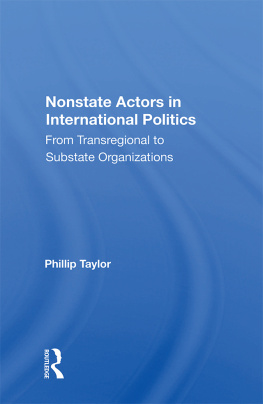POWER, INTERDEPENDENCE, AND
NONSTATE ACTORS IN WORLD POLITICS
POWER, INTERDEPENDENCE,
AND NONSTATE ACTORS IN
WORLD POLITICS
Edited by
Helen V. Milner
Andrew Moravcsik
Copyright 2009 by Princeton University Press
Published by Princeton University Press, 41 William Street, Princeton, New Jersey 08540 In the United Kingdom: Princeton University Press, 6 Oxford Street, Woodstock, Oxfordshire OX20 1TW
All Rights Reserved
Library of Congress Cataloging-in-Publication Data
Power, interdependence, and nonstate actors in world politics / edited by Helen V. Milner, Andrew Moravcsik.
p. cm
Includes bibliographical references and index.
ISBN 978-0-691-14027-8 (alk. paper) ISBN 978-0-691-14028-5 (alk. paper) 1. Nongovernmental organizations. 2. International agencies. 3. International relations. I. Milner, Helen V., 1958 II. Moravcsik, Andrew.
JZ4841.P68 2009
341.2dc22
2008042222
British Library Cataloging-in-Publication Data is available
This book has been composed in Sabon
Printed on acid-free paper.
press.princeton.edu
Printed in the United States of America
10 9 8 7 6 5 4 3 2 1
To Robert O. Keohane,
teacher, colleague, mentor, and friend
Contents
CHAPTER 1
Power, Interdependence, and Nonstate Actors in World Politics: Research Frontiers
Helen V. Milner
CHAPTER 2
Institutions, Power, and Interdependence
Randall W. Stone
CHAPTER 3
The Transaction Costs Approach to International Institutions
Michael J. Gilligan
CHAPTER 4
The Influence of International Institutions: Institutional Design, Compliance, Effectiveness, and Endogeneity
Ronald B. Mitchell
CHAPTER 5
Peacekeepers as Signals: The Demand for International Peacekeeping in Civil Wars
V. Page Fortna and Lisa L. Martin
CHAPTER 6
Women and International Institutions: The Effects of the Womens Convention on Female Education
Beth A. Simmons
CHAPTER 7
Private Governance for the Public Good? Exploring Private Sector Participation in Global Financial Regulation
Layna Mosley
CHAPTER 8
Power, Interdependence, and Domestic Politics in International Environmental Cooperation
Elizabeth R. DeSombre
CHAPTER 9
The Dynamics of Trade Liberalization
Vinod K. Aggarwal
CHAPTER 10
International Intellectual Property Rights in a Networked World
Jonathan D. Aronson
CHAPTER 11
The Big Influence of Big Allies: Transgovernmental Relations as a Tool of Statecraft
Timothy J. McKeown
CHAPTER 12
On Taking Religious Worldviews Seriously
J. Ann Tickner
CHAPTER 13
Robert Keohane: Political Theorist
Andrew Moravcsik
Figures and Tables
Figures
Tables
Contributors
Vinod K. Aggarwal, University of California at Berkeley
Jonathan D. Aronson, University of Southern California
Elizabeth R. DeSombre, Wellesley College
V. Page Fortna, Columbia University
Michael J. Gilligan, New York University
Lisa L. Martin, Harvard University
Timothy J. McKeown, University of North Carolina at Chapel Hill
Helen V. Milner, Princeton University
Ronald B. Mitchell, University of Oregon
Andrew Moravcsik, Princeton University
Layna Mosley, University of North Carolina at Chapel Hill
Beth A. Simmons, Harvard University
Randall W. Stone, University of Rochester
J. Ann Tickner, University of Southern California
Preface
International relations would be a very different discipline today were it not for the contributions of Robert O. Keohane. The citation trail alone, which passes through countless and books and articles, tracks his influence. Equally important is Bobs personal imprint: his strong mentoring of graduate students at Stanford, Brandeis, Harvard, Duke, and now Princeton, many of whom have become successful academics.
On February 1819, 2005, a group of those students came together at Princeton University to celebrate Bobs career. The large size and broad diversity of the group testify both to his tremendous energy and influence and to his determination to broaden access to the senior ranks of the profession. Not all of his former students could make it to Princeton, and not all could be represented in this volume, but we know that all share our deep appreciation and respect for Bob and his research.
The Princeton meeting explored the evolution of Keohanes research agenda in recent years. The authors in this volume, who presented papers at the meeting, and others whose work is not represented, had a chance to thank him for the support and intellectual guidance he has given us over these many years. As academics, our appreciation is most durably expressed by using his ideas to stimulate wide-ranging research and by emulating his passion for teaching. But the existence of this volume provides a specific, concrete tribute in appreciation for his lasting impact on our careers.
A great scholar sets an intellectual agenda that grows and develops in anticipated and unanticipated directions, motivating other scholars to do their best work both in furthering the animating ideas and in pushing against them. The institutionalist research program that Bob helped create has had an enormous influence in international relations. The chapters here testify to that impact. Bob has fostered an inquisitive yet rigorous research style among his students. His openness to new ideas, combined with his interest in research design, has produced novel research across a diverse set of important topics. He has trained students who agree and disagree with him. Thus the work in this volume illustrates both the strengths and weaknesses of the research program he helped found.
A great mentor guides and pushes his students at the start of their careers and then supports them wherever their paths may lead. Bob has done both. We intend this volume to celebrate his long and distinguished career and hope that it helps advance in some small way the many ideas and themes he continues to pursue.

